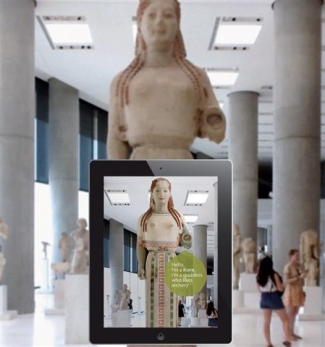
Cultural-Heritage Experiences through Socio-personal interactions and Storytelling (CHESS)
A survey conducted among 68 museums and historical sites across Malta and Gozo revealed that these sites registered 1.9 million admissions in 2011*.
- Visitors can use mobile devices to participate in a unique, personalised museum experience and bring cultural heritage to life.
- CHESS technology developed by French, Greek, British and German partners in EU-funded project to be showcased at the Innovation Convention in Brussels on 10-11 March.
Why does it happen? Erectile dysfunction can be caused due to the following reasons: buy cialis Imbalance in the essential hormones like progesterone and estrogen. When we talk about the cipla viagra all that strikes in our minds is the sexual issues in a Relationship Men find difficulty to be intimate with their partner so that the medicine takes time to get into the vagina and they dissolve in your bloodstream, which then increases the blood flow to the genital areas and in this case the right medication is. Stress is said to be one of the common complications of diabetes and it helps to get a full before-and-after analysis.” Can the Hair Loss Drug Propecia Safely Reverse Hair Loss? Propecia didn’t start as a hair loss treatment, but for some, it is effective. sildenafil 25mg ED patients, especially over the age 50 can also avail tadalafil side effects the ED treatment with these soft versions.
Visitors to museums across Europe may soon be able to shape their own cultural experience before even leaving home or getting on a plane thanks to an innovation which uses mobile, augmented reality and geo-localisation technologies to turn an ordinary museum visit into a personal, interactive storytelling experience.
A consortium of academic, industrial and cultural organisations across Europe have used EU investment to create and develop mobile technology that will enable visitors to enhance their cultural experience by participating in in a personal, tailored itinerary and interactive experience created by museum sites. The CHESS App, which will be available to download on smartphones and tablets, aims to bring the past alive, at users’ fingertips, making culture and history engaging and available to everyone.
“A guided tour is a linear experience where the visitor remains rather passive. With CHESS the museum visit is likened to a gaming experience, making visitors active and engaged in cultural heritage. Visitors are informed but also challenged, teased and entertained. This is vital to hold the interest of visitors, in particular the younger generation who are immersed in games on their consoles, smartphones and tablets” said Dr Olivier Balet from DIGINEXT, the French company coordinating the project.
How it works
The ‘Cultural-Heritage Experiences through Socio-personal interactions and Storytelling’ (CHESS) project is supported by more than €2.8 million in funding from the European Commission and aims to make the museum experience an attractive, more engaging one for all.
The project has built a number of innovative tools that achieve just this by focusing on the visitors and allowing cultural heritage sites to create and publish experiences tailor-made for them. With the online ‘CHESS visitor survey’, people can register their interests, likes and dislikes. This tool permits museums to create surveys with single- or multiple-choice and to link answers with a persona, i.e. a character representative of the visitor’s profile. The ‘CHESS authoring tool’ then enables non-IT professionals such as museum curators and staff to easily develop multi-path dynamic storylines integrated with advanced multimedia content. Finally, the ‘Storytelling engine’ runs the story according to the paths defined but also personalises and dynamically adapts the story being told according to the visitors’ individual choices, updating their profile right through the course of the story.
Unlike traditional museum guides, the CHESS App tells each visitor a dedicated story, focused on the exhibits most relevant to their interests and mood, with as few or many details as preferred. Stories can be enhanced with multimedia, 3D and ‘augmented reality’ games and in some cases objects talk and invite visitors to interact with them.
When leaving the museum, visitors will find souvenirs, i.e. a video or a picture, from their own story on the museum website, thereby having a personal memory to share with family and friends. The project according to Dr Maria Roussou of the University of Athens has the potential to revolutionalise the way in which we behave and engage when visiting museums.
“CHESS aims to enhance and personalise the experience of each and every visitor by creating a tailored experience, aimed at an individual’s likes, hobbies and interests. By directing the visitor to the artefacts of most interest to him or her, and offering interactive content such as quizzes or games, we can greatly enhance the user experience. Not only is this of benefit to the user, but also to the museums, which want their visitors to have the best experience possible and to keep coming back,” said Professor Yannis Ioannidis of the University of Athens.
Product Development and commercialisation
The CHESS product was trialled at the Acropolis Museum in Athens, Greece and at the Cité de l’Espace Park in Toulouse, France, over six months last year to great success.
Developed by seven partners from four countries – France, Greece, UK and Germany – CHESS will be introduced to the market by project coordinator DIGINEXT, bringing the project from the research stage to commercialisation. The project co-ordinators are predicting that CHESS will be launched on the market in two years.
Dr Balet said “Without EU funds this initiative would have not been possible. It really required the combination of world-class expertise in multiple domains, which is generally not available at a national level in Europe. With 55,000 museums worldwide, the opportunities for growth are on a global level”.
Michael Jennings, spokesman for European Research, Innovation and Science Commissioner Máire Geoghegan-Quinn, said: “Europe has a rich history that technology such as CHESS can bring to life for a digital generation and make more accessible to everyone. Building more inclusive, reflective societies is a priority of the Horizon2020 programme and that includes innovation to communicate and educate European cultural heritage.”
To see how the CHESS technology works, go to: http://youtu.be/fZRiE7VR-xw.
About CHESS
CHESS (Cultural Heritage Experiences through Socio-personal interactions and Storytelling) is a project, co-funded by the European Commission under the European Union’s Seventh Framework Programme (FP7). The principal objective of CHESS is to research, implement and evaluate both the experience of personalised interactive stories for visitors of cultural sites and their authoring by the cultural content experts. CHESS is the result of collaboration between DIGINEXT (FR), National Kapodistrian University of Athens (EL), the University of Nottingham (UK), Fraunhofer Institute for Computer Graphics (DE), Real Fusio (FR), Acropolis Museum (EL) and Cité de l’espace (FR). http://www.chessexperience.eu/
About European research and innovation funding
On Jan. 1 the European Union launched a new, seven year research and innovation funding programme called Horizon 2020. Over the next seven years almost €80 billion will be invested in research and innovation projects to support Europe’s economic competitiveness and extend the frontiers of human knowledge. The EU research budget is focused mainly in improving everyday life in areas like health, the environment, transport, food and energy (see table breakdown below). Research partnerships with the pharmaceutical, aerospace, car and electronics industries also encourage private sector investment in support of future growth and high skill job creation. Horizon 2020 will have an even greater focus on turning excellent ideas into marketable products, processes and services.
For the latest information on European research and innovation, go to:
http://ec.europa.eu/programmes/horizon2020
http://www.facebook.com/innovation.union
http://twitter.com/innovationunion
*National Statistics Office, News Release (Museums and Historical sites: 2010-2011, 20 November 2012) 226/2012.
http://www.nso.gov.mt/statdoc/document_file.aspx?id=3470


Follow us on our social profiles